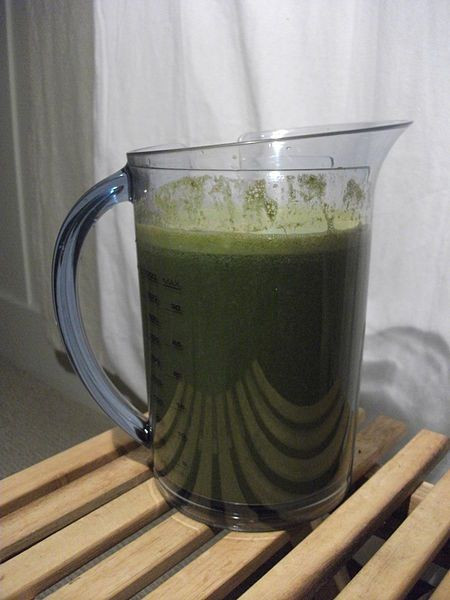Kids Are Now Doing Juice Cleanses: Doctors Concerned About The Dangers Of Children’s ‘Detox’ Trend

Though there’s an obesity epidemic in the U.S. and serious concern about childhood obesity, there are also a fraction of kids out there who are beginning to pick up on their parents’ “green” habits and become hooked on juice cleanses. And doctors say this may not be the best trend.
Juice cleanses are often five-day affairs (or two-week ones) that involve consuming nothing but liquid juices supposedly packed with nutrients, antioxidants, and fiber. The idea is to “clean” out your system and jump-start a weight loss program, though people on juice cleanses are advised not to do any intense workouts during that time — not eating real food can leave you pretty weak and exhausted.
Sofia Davella is an example of a child who’s become addicted to stealing her mother’s juices from the fridge. At 6 years old, Sofia enjoys drinking her mom’s concoctions, labelled “Fountain of Youth” and “Glo.” Her mother, Sandra Davella, is a 44-year-old banker who gets upset because the kale products are expensive — up to $80 a day. “I have to buy extra because I know she’s going to take it,” Davella told the New York Post. “She’s not a French fry kid.”
Most of the companies that create these weight loss potions aim their products at adults; besides, children do need proper nutrition during their integral developmental years. But many of these companies seem to think it’s OK for kids to start juice cleansing at a young age. “For adults and kids alike who are trying to lose weight, these raw and organic drinks are a great kick-starter,” Stephanie Walczak, founder of the health food company called Rawpothecary, told the New York Post. On its website, Rawpothecary describes its juices as a blend of greens and fruits. “Leaving our fruit, veggies, and seeds in their purest, unprocessed state allows your body to absorb all the benefits that Mother Nature intended us to have with each ingredient we use… most importantly the FIBER,” the website says, adding that fiber can help lower cholesterol and monitor blood sugar level. Another company called Dherbs.com actually targets their juices for kids, touting a product called “Children’s Cleanse.”
Indeed, these fancy juice cleanses may have their short-term benefits: making you feel lighter, and seemingly healthier, for a few days at least. But to what extent is it necessary for a child to be on any sort of regiment like this? Walczak says that these products can be meal replacements or supplements for children: “It’s complete nutrition.”
Medical experts and doctors, on the other hand, are more alarmed about the trend. They believe the opposite: that it’s an excessive, overly expensive, unnecessary and even potentially harmful notion.
Keith Ayoob, associate clinical professor of pediatrics at Albert Einstein College of Medicine in NYC, told Local 10 News that the trend is “outrageous and a real concern.” He continued, “Kids don’t need a cleanse, they need good food. … If you are losing 10 pounds in 10 days, then you’re mostly losing water and muscle mass, and that’s not good for children. As meal replacements, this does nothing to train children to have good eating habits for the long-term. … This is ridiculously expensive nutrition. Good nutrition can be and is much more economical. A perfect example of how complicated doesn’t mean better.”
The idea behind juice cleansers is to clean out the colon system, though doctors say it does this on its own, quite naturally, without the aid of expensive products. Likewise, the stomach itself is in a way a “juicer” — it breaks down food and is able to extract the necessary vitamins and nutrients it needs. So eating well — and eating real food — should do the trick just fine.



























